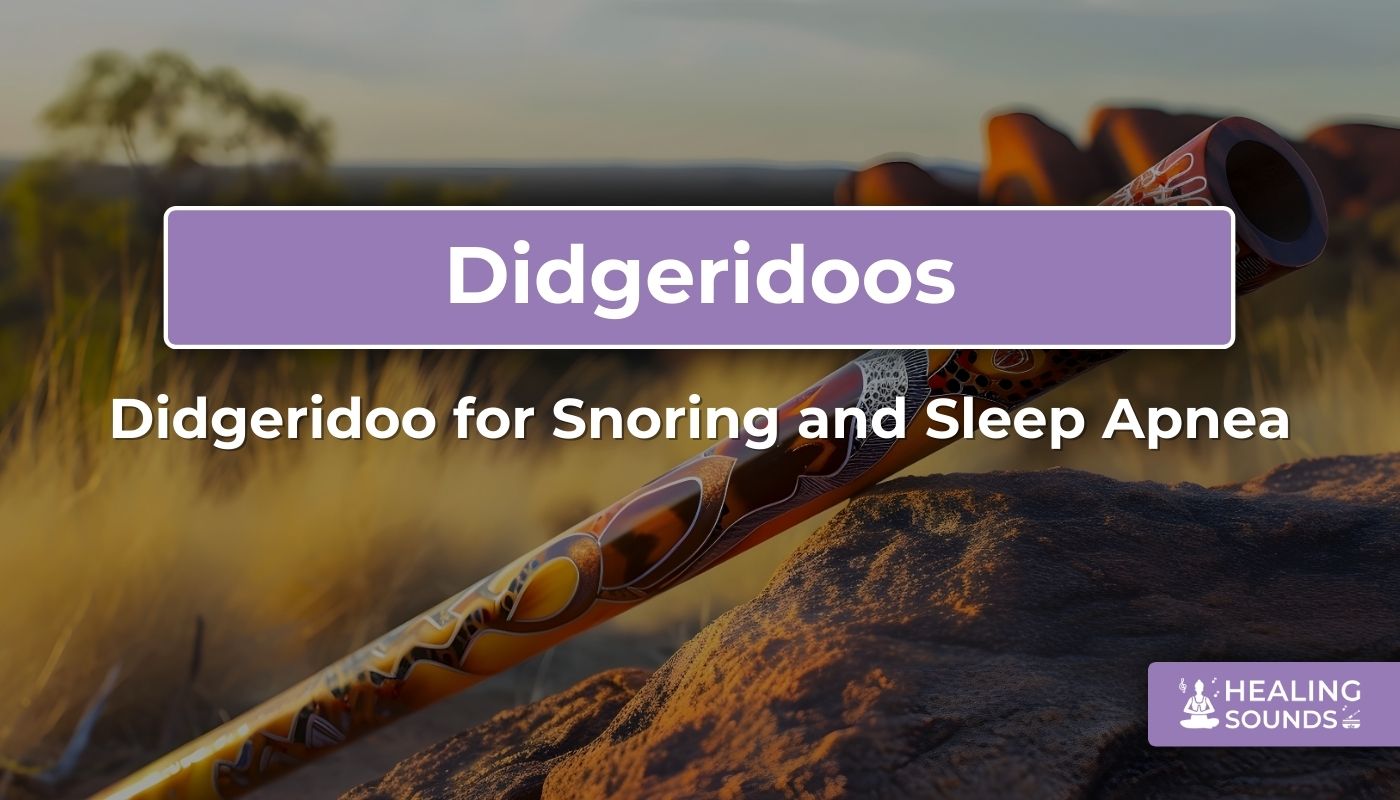Das tiefe, resonante Summen des Didgeridoos, eines traditionellen australischen Instruments, bietet mehr als nur fesselnde Musik. Für diejenigen, die unter störendem Schnarchen und den schwerwiegenden gesundheitlichen Folgen von Schlafapnoe leiden, bietet dieses alte Blasinstrument einen einzigartigen, natürlichen Therapieansatz. Wenn Sie ergänzende Therapien jenseits konventioneller Behandlungen suchen und von der heilenden Kraft des Klangs fasziniert sind, sind Sie hier genau richtig. Dieser Artikel untersucht den faszinierenden Zusammenhang zwischen dem Didgeridoo-Spielen gegen Schnarchen und Schlafapnoe und zeigt, wie diese Praxis zu ruhigeren Nächten und einer verbesserten Atemwegsgesundheit führen kann.
Was ist ein Didgeridoo?
Das Didgeridoo stammt von den Ureinwohnern Nordaustraliens und ist ein Blasinstrument, das traditionell aus Hartholz gefertigt wird, oft aus von Termiten ausgehöhlten Eukalyptuszweigen. Sein charakteristischer, dröhnender Klang entsteht durch die Vibration der Lippen in das Mundstück mithilfe einer speziellen Technik namens Zirkularatmung.
Das Didgeridoo ist nicht nur für seine Rolle in kulturellen Zeremonien und der Weltmusik bekannt, sondern wird auch zunehmend für seine gesundheitsfördernde Wirkung geschätzt. Es ist ein einzigartiges Musikinstrument für die Schlafapnoe- Therapie, das Klang und Atemarbeit für das körperliche Wohlbefinden nutzt.
Wie kann das Spielen des Didgeridoos gegen Schnarchen helfen?
Schnarchen entsteht häufig dadurch, dass sich das Gewebe der oberen Atemwege im Schlaf entspannt und durch die Luftzufuhr vibriert. Durch das Didgeridoo-Spielen werden genau diese Muskeln aktiv beansprucht und gestärkt. Die speziellen Techniken, insbesondere die Zirkularatmung, trainieren gezielt Hals und Gaumen.
Regelmäßiges Üben stärkt die Muskulatur der oberen Atemwege und verringert so deren Erschlaffung und Vibrationen im Schlaf. Dies bekämpft eine der Hauptursachen für Schnarchen und führt zu ruhigeren, erholsameren Nächten für den Spieler und seine Familie. Das Didgeridoo wirkt gegen Schnarchen , indem es den Muskeltonus der Atemwege direkt verbessert.
Didgeridoo als ergänzende Therapie bei Schlafapnoe
Obstruktive Schlafapnoe (OSA) ist eine Erkrankung, bei der die Atmung während des Schlafs aufgrund blockierter Atemwege wiederholt aussetzt und wieder einsetzt. CPAP-Geräte sind eine gängige Behandlungsmethode, Didgeridoo-Spielen kann jedoch eine wertvolle ergänzende Strategie sein.
Wissenschaftliche Untersuchungen belegen die Vorteile des Didgeridoos bei der Behandlung von Schlafapnoe . Eine im British Medical Journal (BMJ) veröffentlichte Studie ergab, dass regelmäßiges Didgeridoo-Spielen die Tagesmüdigkeit und die Schwere mittelschwerer OSA deutlich reduzierte. Die Teilnehmer übten durchschnittlich 25 Minuten pro Tag, 6 Tage die Woche.
Didgeridoo-Spielen dient im Wesentlichen als Atemtraining. Es stärkt die Dilatatormuskulatur der oberen Atemwege und hilft so, die Atemwege während des Schlafs offen zu halten. Dies macht es zu einer attraktiven Option für alle, die neben schulmedizinischer Beratung auch eine alternative Schlafapnoe-Behandlung mit Didgeridoo- Praktiken in Betracht ziehen. Aufgrund dieses spezifischen Nutzens gilt es für viele als das wichtigste australische Instrument zur Schlafapnoe -Therapie.

Didgeridoo, australisches Instrument für Klangheilung
$179.90 $249.90
Dieses hochwertige Didgeridoo erzeugt satte, resonante Töne, die sich ideal für die Klangtherapie und die Atemübungen eignen, die zur Stärkung der Atemwegsmuskulatur zur Linderung von Schnarchen und Schlafapnoe erforderlich sind.
Produkt entdeckenDie Wissenschaft hinter der Didgeridoo-Therapie bei Schlafproblemen
Der Hauptmechanismus hinter der Wirksamkeit des Didgeridoos liegt in der Stärkung der oberen Atemwegsmuskulatur. Die Zirkularatmung, die Technik zur Erzeugung eines kontinuierlichen Dröhnens, erfordert koordinierte Bewegungen der Zungen-, Wangen- und Halsmuskulatur.
Dieses regelmäßige „Training“ erhöht den Tonus und die Steifheit dieser Muskeln. Stärkere Atemwegsmuskeln neigen weniger zum Kollaps im Schlaf, der Ursache für Schnarchen und obstruktive Schlafapnoe. Betrachten Sie es als gezielte Physiotherapie für Ihre Atemwege, die sich am Rhythmus und den Anforderungen des Instruments orientiert. Weitere Informationen zur Schlafapnoe finden Sie in den umfangreichen Ressourcen der Sleep Foundation .
Auswahl und Erlernen des Didgeridoos für therapeutische Zwecke
Die Wahl des richtigen Didgeridoos ist wichtig, wenn Sie therapeutische Übungen durchführen möchten. Achten Sie auf ein Instrument, das sich angenehm spielen lässt und einen resonanten Klang erzeugt, der zum regelmäßigen Gebrauch einlädt.
Materialien wie Eukalyptus, Bambus oder Teakholz sind weit verbreitet. Manche bevorzugen längere Instrumente für tiefere Töne, Anfänger finden jedoch möglicherweise etwas kürzere Instrumente anfangs einfacher zu handhaben. Entscheidend ist, ein Instrument zu finden, das Sie motiviert, regelmäßig Didgeridoo-Übungen gegen Schlafapnoe zu spielen .
- Beständigkeit ist der Schlüssel: Versuchen Sie, an den meisten Tagen der Woche etwa 20 bis 30 Minuten zu üben.
- Meistern Sie die Zirkularatmung: Diese Technik ist grundlegend. Viele Online-Tutorials und lokale Lehrer können Ihnen dabei helfen.
- Seien Sie geduldig: Lernen braucht Zeit. Konzentrieren Sie sich auf schrittweise Verbesserungen und genießen Sie den Prozess.
- Suchen Sie nach Anleitung: Erwägen Sie Unterricht oder Workshops, um die richtige Technik effizient zu erlernen.
Manche fragen sich vielleicht: „ Wie habe ich meine Schlafapnoe auf natürliche Weise geheilt? “, doch es ist wichtig, das Didgeridoo als wirksame ergänzende Therapie zu betrachten. Es wirkt am besten, wenn es in einen ganzheitlichen Gesundheitsansatz integriert wird, der Änderungen des Lebensstils und die Konsultation von medizinischem Fachpersonal umfassen kann, insbesondere bei mittelschwerer bis schwerer Schlafapnoe.
Entdecken Sie unsere Didgeridoo-Auswahl für die therapeutische Praxis

149,90 €
209,90 €
Dieses Didgeridoo aus robustem Teakholz bietet eine hervorragende Resonanz und ist ideal für Anfänger, die mit der Didgeridoo-Therapie zur Schnarchlinderung beginnen. Mehr erfahren ➔

149,90 €
209,90 €
Dank des kompakten Spiraldesigns können Sie Übungen zur Stärkung der Atemwege überall bequem durchführen und sich so ideal für eine regelmäßige Schlafapnoe-Therapie eignen. Mehr erfahren ➔

159,90 €
219,90 €
Hergestellt aus traditionellem Eukalyptus, bekannt für seine tiefe Resonanz, die sowohl meditative Übungen als auch die therapeutischen Vorteile des Atemmuskeltrainings verbessert. Mehr erfahren ➔
Integrieren Sie das Didgeridoo-Üben in Ihren Alltag
Regelmäßiges Üben führt zu Ergebnissen. Suchen Sie sich einen Ort und eine Zeit, in der Sie 20 bis 30 Minuten ohne Unterbrechung üben können. Viele Menschen finden, dass abendliches Üben ihnen hilft, vor dem Schlafengehen zu entspannen und so möglicherweise besser einzuschlafen.
Konzentrieren Sie sich auf die Qualität Ihrer Übungen, insbesondere auf die Beherrschung der Zirkularatmung und die Aufrechterhaltung eines gleichmäßigen Brummens. Mit der Zeit stärkt diese regelmäßige Übung die Atemwegsmuskulatur und trägt so zu weniger Schnarchen und einer besseren Behandlung von Schlafapnoe bei.
Fazit: Ein gesunder Weg zu besserem Schlaf
Das Didgeridoo bietet eine einzigartige und ansprechende Methode zur Bekämpfung von Schnarchen und zur Ergänzung der Schlafapnoe-Behandlung. Durch die Stärkung der oberen Atemwegsmuskulatur durch die spezifischen Anforderungen des Spielens, insbesondere der Zirkularatmung, können Betroffene eine deutliche Verbesserung der Schlafqualität und eine Verringerung der Atemnot erfahren.
Dieses alte australische Instrument verbindet Musik, Kultur und Wellness und bietet eine natürliche Möglichkeit, die Atemwege zu verbessern. Wenn Sie bereit sind, das therapeutische Potenzial des Didgeridoos gegen Schnarchen und Schlafapnoe zu erkunden, bietet Healing Sounds eine kuratierte Auswahl hochwertiger Instrumente, um Ihre Reise zu ruhigeren Nächten und revitalisierenden Tagen zu beginnen.
Häufig gestellte Fragen zum Didgeridoo gegen Schnarchen und Schlafapnoe
Ja, Studien haben gezeigt, dass regelmäßiges Didgeridoo-Spielen dazu beitragen kann, die Schwere der mittelschweren obstruktiven Schlafapnoe (OSA) zu verringern und die Tagesmüdigkeit zu verringern, indem es die Muskeln in den oberen Atemwegen stärkt und so ein Erschlaffen während des Schlafs verhindert.
Das Didgeridoo ist weithin als nützliches Musikinstrument bei Schlafapnoe anerkannt und wird wissenschaftlich untersucht, da es eine einzigartige Zirkularatmung erfordert, die speziell auf die an OSA beteiligten Muskeln der oberen Atemwege abzielt und diese stärkt.
Das Didgeridoo ist ein australisches Instrument, das für seine therapeutische Wirkung bei Schlafapnoe bekannt ist. Es stammt von den australischen Ureinwohnern und seine Spieltechnik stärkt die Atemwegsmuskulatur.
Während manche Menschen ihre Symptome durch natürliche Methoden wie Gewichtsverlust, Lebensstiländerungen und eventuell Didgeridoo-Spielen deutlich lindern können, ist es wichtig zu verstehen, dass die natürliche „Heilung“ von Schlafapnoe komplex ist und sehr unterschiedliche Auswirkungen hat. Konsultieren Sie immer einen Arzt, bevor Sie verordnete Behandlungen ändern. Didgeridoo-Spielen wird am besten als ergänzende Therapie betrachtet.
Das wichtigste Musikinstrument, das zur Linderung von Schnarchen und Schlafapnoe untersucht und anerkannt wurde, ist das Didgeridoo. Seine einzigartige Spieltechnik trainiert und stärkt direkt die Muskeln der oberen Atemwege, die für diese Beschwerden verantwortlich sind.

